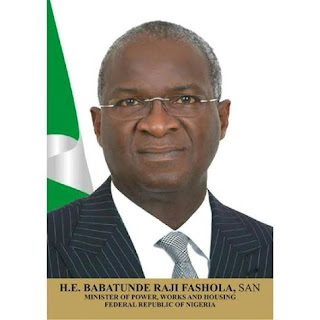
After a holistic examination of the power sector problems, the Federal Government is taking gradual but aggressive measures in short and long-terms.
The incremental power policy initiated by the Minister of Power, Works & Housing, Babatunde Fashola is the short-term solution. The mega projects, such as the Mambilla project expected to generate over 3000 megawatts (mw) is the long-term solution.
To Fashola, it makes no economic sense to concentrate on building new power projects and abandon the idle completed but faulty power plants as well as those on the verge of completion but abandoned for one reason or the other. He said the country has over 12,000mw idle capacity.
Fashola said: “Let’s get these idle megawatts on stream by making rehabilitation of the power a priority. Let’s make use of what we have first before looking for new ones, he said. It is this conviction that led to embarking on the incremental power policy.
“We cannot have 12,000Mw installed and be concentrating on new ones without optimizing the existing ones – Egbema and Gbarain power plants are not finished, Olorunsogo, Omotosho, and Geregu are not optimised because there is not enough gas.
“In some places there are transmission problem. This is what the ministry is now tackling. The Federal Government’s focus now is on what will help on immediate contribution to increased power, whether it is on generation, transmission or distribution segment of the value chain. It is this priority that will determine the project government will award the contract.”
“If it is transmission project, we will award the contract. It is the one that goes to a power plant that is ready to deliver power? Some have gas and the power is there, but they cannot evacuate. So, let’s build the transmission line. Some have the transmission facility but don’t have gas. So, let’s build the gas pipeline.
“That is what is happening in places like Omoku plant in Rivers State. We will complete Omoku by March this year and it will give us about 270mw. We will finish Gbarain any time from now and it will give us over 115mw, Alaoji by June this year.”
The minister went further: “We will get more power from Kaduna, 215mw. We will get 10mw from wind plant in Katsina State this year. Zungeru project would have given us 700mw but was locked up in court for three years before we came on board. We have got the parties out of court but have lost three years. It will deliver by early next year another 700mw. Azura in Edo State, they refused to sign the partial risk guarantee but the Buhari administration has signed it.
“Azura project is on track and will be finished in June this year and will give us 450mw. So, we have to prepare to evacuate Azura and I have submitted the memo to the Federal Executive Council (FEC) to approve the funding. We have to quickly build a 14-km 330kv line so we can evacuate power produced there to the grid.
“We are also trying to complete some rural electrification projects using Rural Electrification Agency (REA). There are many rural electrification projects from 1999 including various constituency projects. All of that will translate to more power.”
At the last all-stakeholders’ monthly meeting in Kogi State last month, it was reported at the meeting that Geregu Power Plant owners whose majority shareholder is Forte Oil Plc, invested $94 million and raised the generation capacity from 414mw to 434mw.
Stakeholders at the meeting acknowledged significant improvement on generation capability from what it was in January/March 2017, when it was constrained by gas and debts to GenCos and Gas Suppliers.
They acknowledged that the N701 billion guarantee programme has helped in securing the production side of the value chain by enabling the Nigerian Bulk Electricity Trading (NBET) Plc to pay generating companies and gas suppliers.
The running of the three turbines in Gergu I is part of the successes recorded by the intervention on generation. Only one out of turbines in Geregu I and II were running when the minister visited in 2016. The new challenge is that the turbine output is curtailed due to insufficient distribution infrastructure to take the power from the power plants.
They said: “Available nationwide generation capacity has reached over 7000mw, which cannot be evacuated due to the Transmission Company of Nigeria’s (TCN’s) efforts to improve and complete transmission facilities with the support of state governments such as Kogi State. Distribution Companies have pledged to match the transmission capacity in order to deliver the additional 2000mw to consumers.
“On Friday December 8, 2017, a peak generation of 5155mw to the grid was reached, surpassing the previous peak of 5074mw in February 2016, which was the product of team work from the Presidency, TCN, and all government agencies, as well as private generation and distribution companies and the support of the various communities, such as Ajaokuta, which plays host to our vital power infrastructure.”
Fashola also held discussions with the Manufacturers Association of Nigeria (MAN), and various chambers of commerce and industries in the states on how to deliver the unutilised 2000mw generated power.
The Niger Delta Power Holding Company (NDPHC) is also providing assistance to improving generation, transmission and distribution infrastructure. For instance, its intervention has brought tremendous improvement in power supply in Okene, Idah, Confluence Beach, Ankpa, Felele, Ohunene, and Ayingba areas of the state, among others.
NDPHC noted that construction on Okija and Omotosho community connection project is complete and was planned for energization by December 31, 2017
The Benin Electricity Distribution Company noted that all 36 communities in Ondo North are now connected after signing the Memorandum of Understanding with the DisCo, and that connection in Ode-Aiye in Benin DisCo in Ondo South will be completed early this year.
The Enugu Electricity Distribution Company also confirmed that the 60MVA substation at Aba has been restored while TCN noted progress of projects in Obajana, Egbe, Kabba and Okene to improve supply in Kogi State. TCN is also proposing a 330kV line from Makurdi to Ayingba to ensure Kogi State benefits from the upcoming Mambilla Hydro project
The GenCos, DisCos and TCN restated committed to improving customer service in the power sector by informing customers at least seven days in advance of any planned repair or maintenance outage of infrastructure to the affected communities.
According to Fashola, the DisCos are behind other segments of the value chain – generation and transmission, even as he noted the government’s effort at boosting DisCos’ capacity.
Fashola said: “The problem is that DisCos don’t have capacity to expand the way it is expected. We have talked about their challenges – exchange rate, liquidity and population growth, among others. The meter roll out that was expected has not happened in the way we expected it. Some have happened. The second problem is that most of the equipment they bought were old enough, nobody can dispute that. So, they must expand, that is the problem. But we will be able to know what each DisCo needs and what it costs. When get FEC’s approval, they (DisCos) will inject the idle 2000mw into the grid.
The World Bank Group also acknowledged the efforts and improvements in the power sector. The World Bank Group and the Federal Government after a two-day high-level consultation on the Power Sector Recovery Programme (PSRP), reached some agreements. The PSRP is a comprehensive programme of policy, legal, regulatory, operational and financial interventions that will restore service efficiency and long-term power sector viability.
The measures that will be implemented through 2021, are aimed at improving transparency, service delivery and re-establishing investor confidence, and hence, investment in the sector. Accelerating electricity access including through off-grid public private partnerships is an important component of the PSRP.
They assessed progress in implementing the programme and followed on similar high-level talks that took place in Abuja in December 2016 and in Washington during the World Bank/ IMF Spring meetings.








 Similar topics (5)
Similar topics (5)